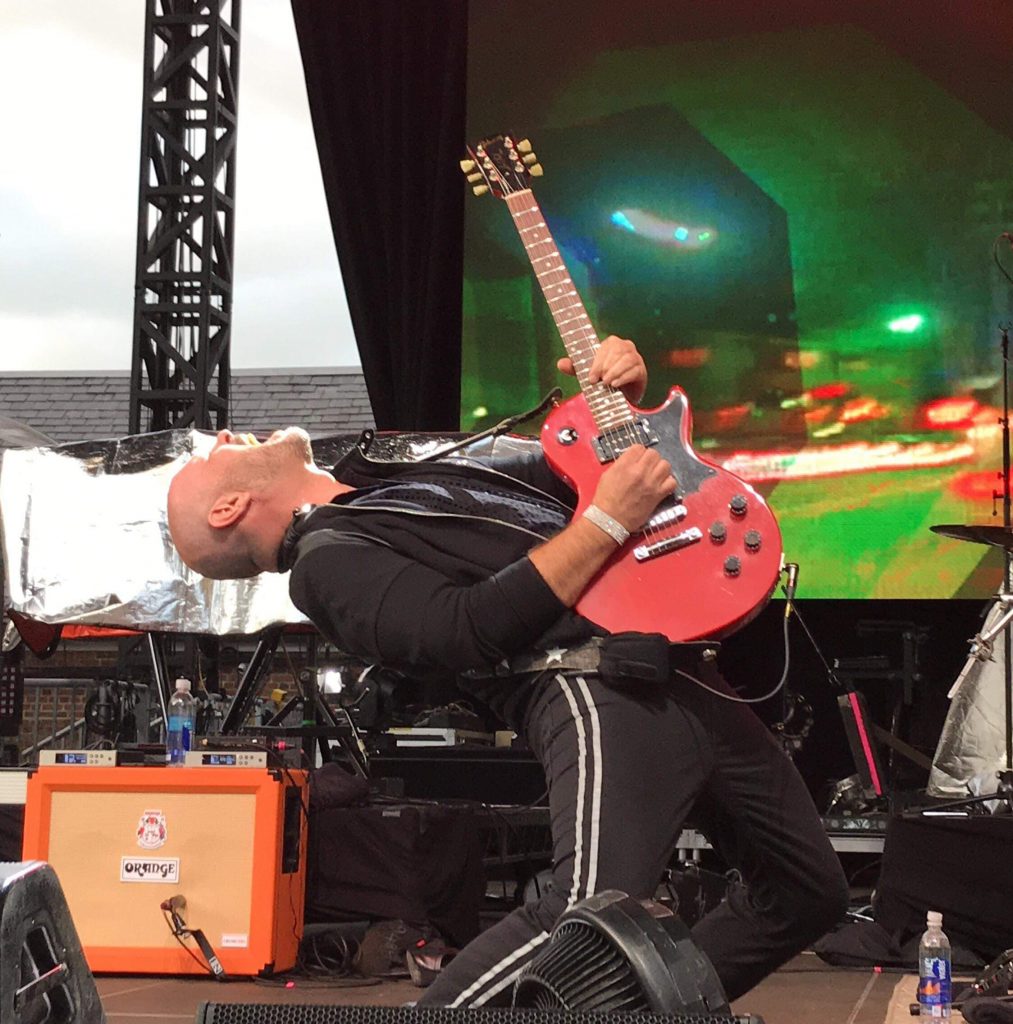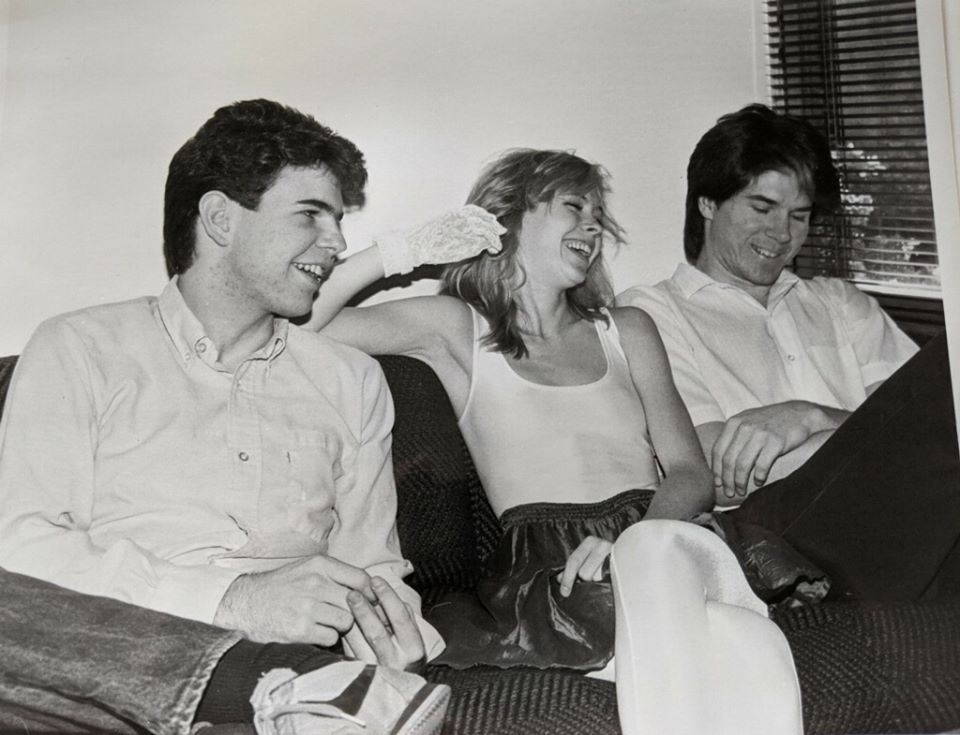By Keith Walsh
I became a fan of the band Berlin by being around, and making recordings in, the Casbah recording studio in Fullerton during the creation of their 1983 breakthrough album, Pleasure Victim. No doubt, there was a ton of talent involved, and perhaps had John Crawford and Terri Nunn not recruited David Diamond, Berlin might have taken much longer to become a household name.
Diamond played a key role in Pleasure Victim and its follow up, Love Life, contributing guitars synths, and songwriting. Then he parted ways with Crawford and Nunn prior to Berlin’s third and last album of the 1980s, Count Three And Pray. Nunn reformed the band in the mid 90s, without Diamond or Crawford, releasing three studio albums between 2002 and 2013.
It seemed possible that the core three members of Nunn, Crawford and Diamond would never work together again, aside from 2003’s Bands Reunited on VH-1, for which the band played a live performance in Los Angeles. More than a decade passed. Then in 2015, Diamond and Crawford reconnected with Nunn, and began performing with her alternate version of the band. As Diamond, who kindly replied to my messages, explains:
A New Beginning
“After a year or so of that, John and I decided to try some music, just to see what would happen,” he said. “I started my crash course in ‘how things are done today,’ and settled on an audio workstation that seemed reasonable. It wasn’t one of the more popular ones, but I’m often out of sync with what’s popular.” David decided on the DAW (digital audio workstation) Bitwig.
“The first few tracks we worked on amazed us,” he continues. “It was like we picked up right where we left off. We played some stuff for Terri, and the two of them came up to my place in Truckee, California to record vocals and see what might happen. There was no question that the classic Berlin sound was again achievable for us. There was a question as to whether that should be our goal, but that’s another discussion.”
As it turns out, the classic Berlin vibe would appear in a highly modified EDM influenced sound, for the band’s 2019 release Transcendance. Fans of all degrees, from diehard to casual, were not disappointed – the album balances elements of classic and new, with lyrics that reflect the more mature perspective that has been evident since the post 80s when Nunn led the band.
Gender politics are still at play here, however. One of Transcendance’s standout tracks is a (sort of) duet with KROQ deejay Richard Blade, in which he attempts to body shame Nunn’s protagonist (“Show Me Tonight.”) It’s sadly comic, but also very timely and relevant. There’s an updated version of “Sex (I’m A)”, which finds John Crawford’s vocal performance enhanced with the rock and roll edge he discovered fronting his hard rock project The Big F in the late 80s and early 90s. Yet the most moving song on the album is the title track, which portrays the loss of an elderly parent in such a way that it deserves to be recognized as an instant classic. It’s based on Nunn’s actual experiences with her mom, and it’s a tear jerker to anyone who’s had similar experiences.
But back to Diamond. As one might expect, he played a key role on Transcendance, contributing production, guitars and synths. Starting in 2016, Diamond, Nunn and Crawford often worked from home studios, eventually sending the products of their labor to producers Andy and Thom Mak in Australia, then to New York for final mixing. Diamond explained that he would create the desired sounds and performances in the Bitwig DAW, transmitting the resulting high resolution WAV files to the producers.

Telecommunication
“Much of what I did for Transcendance I did at my ‘studio’ in Truckee, California,” he told me. “And by studio, I mean a Windows PC with an audio interface, a microphone, some soft synths and an arsenal of guitars. I sent tracks to Australia, where our producers lived. I’m not sure what their studio setup was, but I never saw a bill for any proper recording studio, so I’m guessing their setup was similar. Much of Terri’s vocals were recorded in a bedroom in her home.”
Berlin took advantage of the possibilities of technology. “We could never have imagined being able to work like this back when we recorded the early records,” Diamond explained. “And, to be honest, there are as many cons to this approach as there are pros. But that’s an entirely different discussion.”
Diamond says that when he began collaborating with Nunn and Crawford after reconnecting in 2015, he defaulted to creating familiar sounds. “At first, I was very self-conscious about how I went about things versus what was going on now,” he explains. “It wasn’t that I hated all current music, but I did hate a large portion of it. I still do, though some of it is awesome. But nothing I did sounded like anything you’d hear on the radio today. What I did sounded like Love Life–exactly like Love Life. I’m like the human plugin to get that Love Life effect!”
As the three of them continued to work on the album that would become Transcendance, and with the introduction of Andy and Thom Mak to the process, the sound began to evolve into something somewhat different than the classic sound fans associate with Berlin. And Diamond changed as well.
“I’m not so self-conscious now, though,” he explains. “I’ve since seen how much of what’s considered ‘current’ today is often delivered via plugin effects and a slightly different pop-song structure. I’ve been able to incorporate what I like of it into what I’m doing, without forgoing the Berlin brand. I’ve tried to avoid the cheesy aspect of it as much as possible–the stutters, tape stops and filter effects–but sometimes cheesy is fun.”
Despite geographical distances, the recording of Transcendance was as collaborative a process as any other Berlin album, with each of the three core members sharing duties across the tracks. “One thing that has changed for Berlin is the role each of us takes. When collecting content for the liner notes on Transcendance, we originally listed each thing we did on each track. That quickly became absurd because we no longer have the roles we used to have: John and I both create and play synth, guitar and bass parts. It’s the same for vocals: John might write an original melody that Terri modifies, while any one of us might come up with background vocal ideas. Our producers also contributed creatively, so it ended up being pretty tough to surgically credit people for what they did.”
And while many fans might remember Diamond in the role of keyboardist, those expectations would have to change. “When we started playing live again,” he explains, “people were confused by seeing me play guitar instead of keys. Berlin fans think of me as a synth player but, in fact, I played guitar and bass long before keys–I’ve never considered myself a keyboard player.”

Moving Forward By Looking To The Past
As a multi-instrumentalist who became known as a pioneer of the synth-pop genre in the early 80s, Diamond expresses frustration at those producers and artists who ask him to help them recreate the sound of 80s synth-pop. He says they should be working towards a new way forward with new sounds. And that’s precisely what Berlin has achieved with Transcendance.
And in an age when most music is created using digital technology of some sort or other, Diamond finds his views on music production in high demand.“I came from an era in which what we did was differentiated as ‘electronic music,’ he says. “Now, it’s all electronic music, so I’ve come to value that pedigree more than I realized.”
Diamond has a lot to say on the subject: “What does surprise me–and in a way disappoints me–is the music industry’s obsession with the sound of the 80s. It seems that faithful emulations of old music technology are more sought after than new ideas that push things forward. “
“They promise me that if I use Plugin X,” Diamond continues, ” my recordings will have the warmth of analog tape mixed through an old Neve or SSL console. Really? Do I want this? Have we not been able to improve on this technology in the past decades? Instead, we use all the computing power we have today to make things sound old?”
“Granted, it’s not like I know what we should be doing, or the directions we should have taken. But I lack the visionary genius of Sequential’s Dave Smith or PPG’s Wolfgang Palm. Where are today’s forward thinking technological visionaries? “
Excellent questions. Stay tuned to Synthbeat.com to find out!
Featured image from 1982 by Perry Watts Russell.
finis
